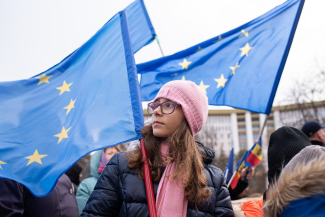Building Optimism Through Arts and Culture in Moldova
Moldova is divided, and for many Moldovans, particularly those outside of the capital or who do not speak Romanian, the country’s European trajectory can feel like a distant issue. These divisions are leveraged by actors who want to undermine the country’s European integration, appealing to fears of eroding traditional values and neglecting smaller communities. Popular Kremlin-backed Telegram channels often highlight the empty, poor villages neglected by Chisinau elites, fueling populist political movements aimed at keeping Moldova in Russia’s orbit.
While propagandists correctly note new cultural forces and positive developments in the capital, they are wrong that certain parts of the country are being left out. Over the past year, OTI has supported cultural leaders who are engaging Moldovans across the country. Polling shows this is contributing to growing optimism for the future and increased support for EU integration, both up by nearly 10 percent since last year.
Folklore and traditions are very important to Moldovans, and the traditional shirt known as an ia has become a symbol of unity and independence since the start of Russia’s full-scale invasion. With OTI funding, a festival celebrating the ia and other traditions has grown significantly. The Ia Mania festival now attracts diverse audiences and serves as a hub for young social media influencers, providing an alternative to Kremlin-backed content.

Traditional forms of music, another unifying cultural element in Moldova, are at risk of being lost. With a grant from OTI, musician George Shova developed a television program about preserving music traditions, emphasizing how Moldova’s unique culture will be protected once Moldova joins the European Union. Shova, an active senior, appeals to both older and younger demographics. His program has become popular even in the Russian-speaking north, sparking discussion among viewers about Moldova’s cultural richness.
Music also plays an especially vital role for young Moldovans. Pasha Parfeni, a popular artist and democracy advocate, held OTI-supported camps under the banner “Moldova has a Voice,” bringing together rising young talent to perform across the country, including in small communities. Some participants have since appeared on high profile stages such as the national Eurovision contest and Moldova’s Got Talent. Concert attendees and online commenters expressed pride in Moldova’s growing music scene and its bright European future.


Similar enthusiasm was evident in OTI-funded workshops organized by the Moldovan National Youth Orchestra. The workshops bring together young musicians and educators and are creating a network of performers across the country. Over 100 of these young musicians performed at the National Youth Orchestra’s Holiday concert, a cultural touchstone broadcast nationwide. Participants, particularly from smaller communities, felt heard and inspired about their future.
Moldova’s film industry is also undergoing a resurgence. With no movie theaters outside the capital, OTI funded a film caravan to bring renowned Moldovan films to various cities. These events are often standing-room only and feature movies about important issues such as Transnistria’s war, everyday corruption, and Russia’s war in Ukraine. Audiences engage in discussions with filmmakers and activists, expressing pride in Moldova’s European-standard filmmaking and appreciation for being included in this cultural revival. President Maia Sandu attended one of the film nights in a small city in North Moldova, receiving a warm welcome from the crowd.
Coming Together for a European Future
When Moldova received an invitation to start European Union accession talks in December 2023, cultural and political leaders celebrated together in front of the presidential palace. As Moldova prepares for a referendum on EU accession this fall, these cultural figures will continue to play a key role in mobilizing community support for a European future. OTI will continue to support these changemakers from the arts, cultural spheres, civil society and independent media in engaging Moldovans in support of European integration.

